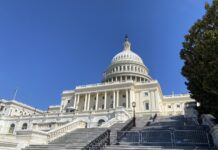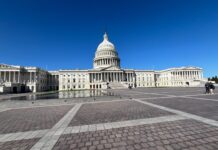
A Republican-led effort to add hundreds of millions dollars to the state’s revenues proposes to raise the state’s current 37-cent per pack rate up to $1.35, which rivals what Florida charges its smokers.
A late-session push in the Senate would raise the state’s cigarette tax and stick a tax on vape products, which has so far eluded legislators.
The Republican-led effort would raise the state’s current 37-cent per pack rate up to $1.35, which rivals what Florida charges its smokers. People would pay $1.25 per fluid milliliter or cubic centimeter for vapor products, which are not taxed today.
Alternative nicotine products, such as pouches or dissolvable strips, would be taxed at 10% of wholesale cost, treating them the same as loose and smokeless tobacco. The bill, though, also lowers the tax on cigars, taking it from 23% of wholesale cost to 12%.
Georgia now has one of the lowest cigarette tax rates in the country.
“Every time a pack of cigarettes are bought it results in all of us paying $5 in health costs we subsidize with our income taxes,” Sen. Chuck Hufstetler, a Rome Republican, tweeted after his Finance Committee backed the bill Friday. “98 cent increase is very reasonable. Quit making taxpayers pay for other’s choices.”
The bill faces long odds with four days left in the session. The bill would still need the full Senate’s backing and then go to the House for consideration, where Republican House Speaker David Ralston represents a major roadblock. “I’m not too keen on that,” Ralston told reporters recently. A bill that would have taxed vape products narrowly failed in the House earlier this year.
House Democrats are also calling for lawmakers to tap the tobacco tax as one way to soften the $2.2 billion cuts being considered for the $28.1 billion budget that cleared the House before the COVID-19 outbreak. They have proposed taking the tax up to $1.87, closer to the national average.
Other groups – like the Georgia NAACP and Georgians for a Healthy Future – have pressed lawmakers to go to the national average before resorting to deep budget cuts, such as nearly $1 billion reduction to the state’s education funding formula and cuts to behavioral health and addiction treatment services.
Gov. Brian Kemp’s newly announced revenue estimate slightly eased the cuts Monday, reducing the revenue shortfall from $2.6 billion to $2.2 billion. For k-12 public schools, for example, this will mean a 10% – rather than an 11% – reduction.
The budget is currently being negotiated in a small legislative committee representing both chambers.
“There are a number of ways for us to find some opportunities to fund the budget and cutting our way out of this budget is not the option,” Rep. Debbie Buckner, a Junction City Democrat who is sponsoring a tobacco hike bill, said Monday. “The option is for us to be responsible and look for other ways to fund this budget at this time.”
The sponsor in the Senate, Sen. Randy Robertson, a Cataula Republican, said he proposed raising the tax rate last spring – a year before the pandemic dampened state revenues. He and others argue that taxpayers are subsidizing smokers’ habits, equating the tax to a user fee.
“We’re basically asking somebody to help pay their health care premium,” Robertson said, referring to the cost to the state’s Medicaid program for treating cigarette-related diseases.
The proposal in House Bill 882, which was stripped and replaced with the tobacco tax proposal Friday, would raise about $450 million, according to an estimate from the Georgia Budget and Policy Institute.
“We still wouldn’t even be in the top half of the states,” Hufstetler said, referring to rankings based on rates. “It would not cover the cost of cigarettes in Medicaid.”
Hufstetler’s committee has proposed eliminating or reducing tax breaks and requiring independent audits for the film tax credit program, which was recently the focus of a pair of critical audits.







